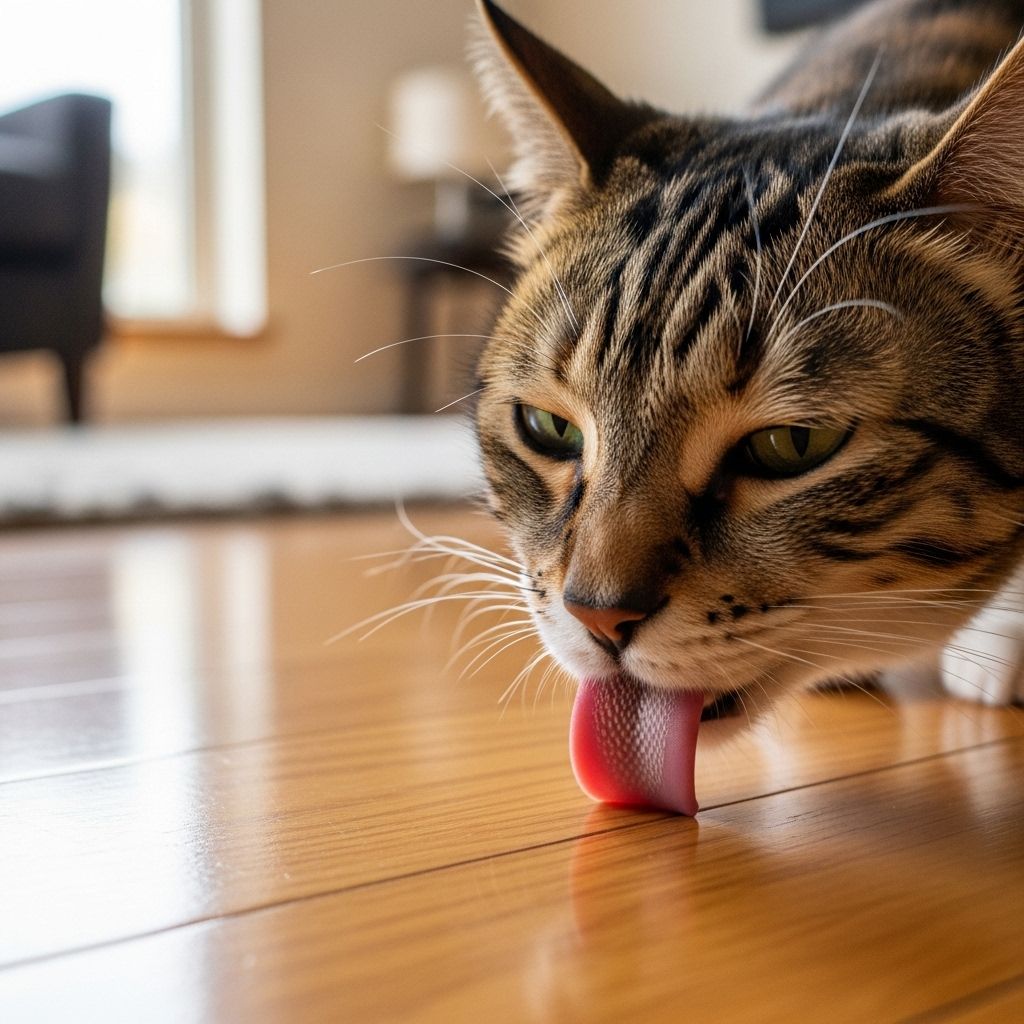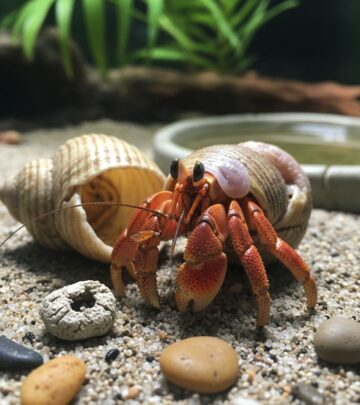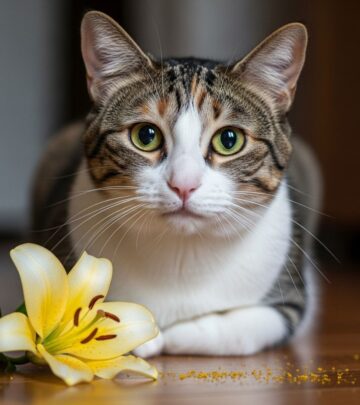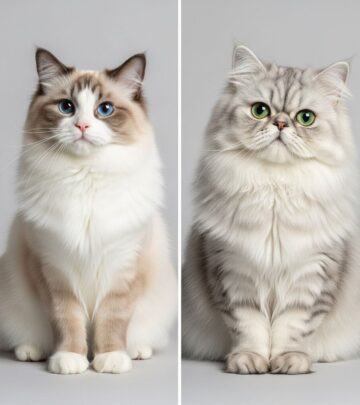Why Is My Cat Licking the Floor? 6 Vet-Verified Reasons Explained
Discover the curious reasons behind cats licking floors—including medical and behavioral causes—and expert advice to ensure your pet’s wellbeing.

Cats are full of mysterious quirks, but finding your feline friend diligently licking the floor can be particularly puzzling for pet owners. Is it just curiosity, or is something more serious at play? This comprehensive guide explores six vet-reviewed reasons why your cat may be licking the floor, how to differentiate between normal and problematic behavior, and what steps you should take to ensure your cat stays healthy and happy.
Understanding Cat Floor Licking: Normal or Concerning?
Occasional floor licking in cats may not be a cause for alarm—many cats use their mouths to explore their environment. However, repeated or obsessive floor licking can sometimes signal health issues or underlying stress. Knowing when to observe, intervene, or consult your veterinarian is crucial for your cat’s well-being.
The 6 Reasons Why a Cat Might Lick the Floor
1. There’s Food on the Floor
Cats have extraordinary senses of smell, far superior to humans. Even if you think you’ve cleaned up every crumb or spill, cats can detect minute traces of food invisible or scentless to us. Animal proteins, like meat juices or broth, can linger on kitchen floors and may attract your cat to lick that area.
- Kitchen hotspots: If you notice your cat licking floors where you prepare or eat meals, it’s likely searching for remnants of tasty treats.
- Not just visible spills: Cats can smell and taste residues even after cleaning.
This behavior is normal and usually harmless, but consistent searching for food outside meal times could point to dietary imbalances or hunger.
2. Exploration and Sensory Curiosity
Cats interact with their world through their senses of smell and taste. Floors, regardless of how often you clean them, hold a variety of scents collected from you, other animals, and general household activity. Licking the floor can be a form of exploration for your cat, especially if the flooring material or cleaning products have unique textures or aromas.
- Tasting new surfaces: Wood, tile, vinyl, and laminate each provide a distinct sensory experience.
- Taste-testing non-food substances: Even polyurethane or cleaning agents (harsh chemicals should be avoided around pets).
Generally, this is an innocent and even playful behavior, but it becomes a concern if accompanied by ingestion of non-food materials (see section Pica).
3. Pica: Eating Non-Food Items
Pica is a medical condition wherein cats crave and eat non-food substances, such as carpet fibers, dirt, plastic, or even floor debris. This is distinct from simple licking—cats with pica will actively chew, rip, or ingest these materials.
- Possible causes:
- Dietary deficiencies (such as lack of essential minerals)
- Medical conditions (anemia, gastrointestinal disorders)
- Behavioral stresses or compulsive disorders
- Signs to watch for:
- Chewing and swallowing non-edible objects
- Vomiting or changes in appetite
- Lethargy or unusual stools
If you suspect pica, contact your veterinarian promptly. Blood tests and other diagnostics may be needed to rule out medical causes.
4. Pruritus (Itching)
Pruritus is the medical term for itching. For some cats, intense itching leads to excessive grooming or even licking floors and other surfaces as a coping mechanism.
- Common causes:
- Fleas or external parasites
- Allergies (environmental, food, or contact)
- Dermal illnesses, such as fungal infections or skin sores
- Associated signs:
- Frequent scratching, biting, or licking themselves and surfaces
- Visible skin redness, hair loss, or scabbing
Licking in response to pruritus is usually paired with other grooming behaviors and may result in bald spots or irritation if the underlying cause is not treated.
5. Stress or Anxiety (Compulsive Licking)
Stress is a common cause of behavioral issues in cats, including compulsive licking. When anxious, cats may develop habits similar to human OCD, such as repetitive grooming or licking objects and surfaces, including floors.
- Potential triggers:
- Moves, changes in household routines
- Addition or loss of pets and family members
- Environmental noise or disruption
- Soothing action: Licking serves as a self-soothing or “displacement” behavior, helping the cat manage anxiety.
If licking seems ritualized or is associated with other changes—such as hiding, over-grooming, or changes in appetite—a behaviorist or veterinarian can help develop a management plan.
6. Difficulty Grooming Themselves
Cats are fastidious groomers, devoting 2–5 hours daily (30–50% of their waking time) to cleaning themselves. If a cat is unable to reach certain areas due to obesity, arthritis, illness, or age, it may redirect this innate grooming drive to objects or the floor.
- Risk factors:
- Older or overweight cats
- Cats with mobility issues or chronic pain
- Behavior pattern: Licking floors, carpets, or other surfaces to satisfy grooming urges.
Consider a vet evaluation if your cat shows decreased flexibility, stiffness, or hesitation while moving or grooming.
Other Influencing Factors: When Floor Licking Requires Special Attention
- Cleaning agents on the floor can be toxic—always opt for pet-safe options if your cat licks surfaces regularly.
- Persistent or sudden floor licking should not be ignored, especially if it’s new, increasing, or accompanied by other changes (vomiting, weight loss, lack of appetite).
- Repeated floor licking after licking walls, concrete, or even dirt might point to mineral deficiencies or medical problems.
Key Medical Conditions to Rule Out
| Possible Condition | Symptoms | Associated Behaviors |
|---|---|---|
| Pica | Eating non-food objects, vomiting, abnormal stools | Chewing carpet, licking walls, eating string/plastic |
| Anemia | Pale gums, lethargy, decreased appetite | Licking cold surfaces, seeking unusual tastes |
| Pruritus (Itching) | Red, irritated skin, bald patches, excessive grooming | Licking floor/fabric after or instead of self |
| Anxiety/Compulsive Disorder | Restlessness, hiding, vocalizations, loss of interest | Ritualized licking, focus on specific spots |
What Should You Do If Your Cat Licks the Floor Frequently?
- Clean thoroughly: Remove food residues with unscented, pet-safe cleaning products.
- Observe: Monitor the frequency, location, and timing of the licking.
- Provide enrichment: Toys, puzzle feeders, and interactive play sessions can reduce boredom and anxiety.
- Address stressors: Identify changes in your cat’s environment and provide extra reassurance during transitions.
- Consult the vet: If licking persists or is compulsive, seek professional advice. Bring a list of observed behaviors and any related symptoms for a comprehensive evaluation.
Cat Licking and Safety: Hidden Dangers
- Floor cleaners and disinfectants: Many household products (bleach, ammonia, phenol-based detergents) are toxic to cats. Swallowing even minute residues can result in vomiting, drooling, or more severe reactions.
- Sharp crumbs or debris: Small, sharp objects can injure your cat’s mouth or digestive tract.
- Environmental toxins: Substances like de-icers, rodenticides, and essential oils are particularly harmful if transferred from the floor to your cat’s tongue.
If you use any products not specifically labeled pet-safe, immediately restrict your cat’s access to treated areas until fully dry and residue-free.
How to Deter Cats from Licking the Floor
- Wipe up spills immediately and wash with unscented, natural cleaners.
- Increase the availability of fresh water throughout the house—cats may seek moisture on floors if preferred sources are missing.
- Rotate toys and engage your cat in daily play sessions to reduce boredom and anxiety-driven licking.
- Regularly vacuum and mop to reduce dust, food crumbs, and loose fibers.
- For stress-prone cats, provide elevated spaces, cozy hiding spots, or pheromone diffusers to help them feel more secure.
Frequently Asked Questions (FAQs)
Is It Normal for a Cat to Lick the Floor?
Occasional licking is usually harmless and part of exploratory behavior, especially after food spills or changes in cleaning products. Persistent or compulsive licking, or eating non-food items, warrants further investigation and possibly a veterinary consultation.
Can Floor Licking Make My Cat Sick?
Yes, especially if the floor is contaminated with toxins or sharp debris, or if the cat is licking up something hazardous (like cleaning products). Certain materials can also cause gastrointestinal obstruction if ingested in quantity.
How Can I Tell If My Cat Has Pica?
Cats with pica do more than lick—they chew and swallow things like carpet, string, plastic, or fabric. You may see them vomiting non-food items or notice changes in their stool. Always consult your vet if you observe these behaviors.
Is Floor Licking Ever an Emergency?
If your cat suddenly starts obsessively licking the floor, especially with other symptoms (vomiting, lethargy, pale gums, loss of appetite), seek veterinary care right away. These may be signs of poisoning, anemia, or an acute health crisis.
Can Anxiety Cause Cat Licking Behaviors?
Yes. Stress and anxiety can result in over-grooming or object licking as a coping mechanism. Resolving the underlying stress and providing enrichment often helps.
Summary Table: Causes of Cat Floor Licking and What to Do
| Reason | Is It Normal? | Action |
|---|---|---|
| Food Residue | Yes | Clean thoroughly, feed regular meals |
| Exploration | Yes | Provide enrichment, monitor |
| Pica | No | See a vet for diagnosis/treatment |
| Pruritus | No | Vet check for skin/parasite management |
| Stress/Anxiety | No | Address stressors, consider calming aids |
| Grooming Difficulty | No | Check for pain, manage weight/health |
When to See the Vet: Signs Your Cat Needs Medical Attention
- Licking is intense, daily, or increasing in frequency
- Your cat is eating (not just licking) odd objects
- Other symptoms: vomiting, diarrhea, lethargy, poor appetite, bad breath
- Visible skin wounds or bald patches
- Unexplained behavioral changes
Final Thoughts
Your cat’s quirky habit of licking the floor may be harmless curiosity or a sign of something deeper. By monitoring your cat, keeping floors clean and safe, and addressing potential health or behavioral reasons, you can ensure that your feline friend stays healthy, comfortable, and well cared for. When in doubt, an evaluation by your veterinarian is always the safest choice.
Read full bio of medha deb












